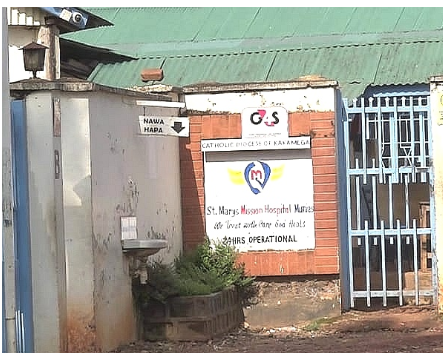The stalled reopening of St Mary’s Mission Hospital Mumias underscores the growing strain facing faith-based health facilities as Kenya transitions from NHIF to the new Social Health Authority. The case exposes systemic delays in claims processing and overreliance on government reimbursements, which threaten service continuity for thousands of patients. Bishop Obanyi’s remarks highlight the urgent need for SHA to streamline disbursements and for hospitals to diversify income sources to remain sustainable. The standoff also signals a wider credibility test for the government’s universal health coverage agenda, as delays risk undermining confidence in the new health financing model.
 St Mary's Mission Hospital Mumias along Kakamega-Mumias road /HILTON OTENYO
St Mary's Mission Hospital Mumias along Kakamega-Mumias road /HILTON OTENYO
The troubled St Mary’s Mission Hospital Mumias, remains closed as the
government is yet to honour its pledge to clear outstanding Social Health Authority
disbursements, Kakamega Catholic Bishop
Joseph Obanyi has said.
Health CS Aden Duale and SHA CEO Dr Mercy Mwangangi met Bishop Obanyi and Governor Fernandes Barasa on September 3, and agreed that
SHA would release Sh14 million
of the pending claims within two weeks to facilitate the hospital’s reopening.
However, the bishop said the
hospital has so far received only Sh7
million, not the full amount promised.
“The funds received were used to
sustain operations at the renal unit, which remains functional,” Obanyi said,
adding that the hospital needs at least Sh20
million to engage striking workers and resume operations.
The facility’s wage bill stands at Sh8 million monthly, and employees are
demanding three months’ salary arrears.
Operations were initially expected
to resume in mid-September.
Obanyi explained that 85 per cent of the hospital’s income
depends on SHA, exposing it to funding delays. “We are exploring ways to
diversify revenue sources to reduce dependence on SHA,” he said.
He further noted that the crisis
began when the defunct NHIF
accumulated Sh143 million in
unpaid claims.
The bishop said the hospital has
struggled to achieve full bed occupancy since the Covid-19 pandemic, which has affected revenue generation. When
fully operational, the hospital can generate up to Sh20 million per month, he added.
He also dismissed claims of
mismanagement, saying audit reports would clarify fund utilisation. “If there
was mismanagement, it cannot be blamed for the closure because the renal unit,
mortuary, and CCC have remained operational,” he said.
Obanyi accused some individuals of
politicising the issue, noting that other faith-based hospitals are facing
similar financial challenges.
He lauded SHA as a promising reform
but called for improved efficiency in disbursements. “The idea is good, but
implementation remains problematic. The fund must make timely payments to avoid
pushing hospitals into crisis,” he said.
“In comparison, NHIF was worse. SHA
has just started — it only needs to get its act together so that we don’t
repeat the same mistakes.”
Instant analysis

















